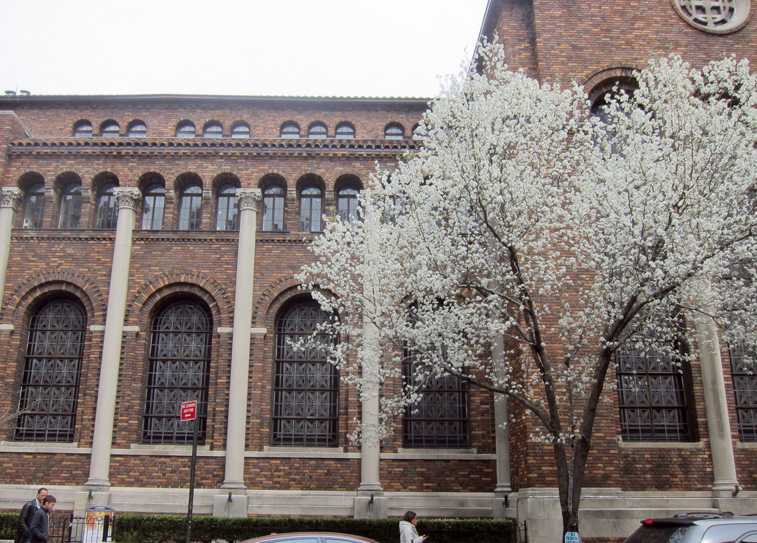Gotham Diary:
No More Sports Talk
30 April 2014
Wednesday, April 30th, 2014
At first, I was very angry with Maureen Dowd — and I’ll come back to her. But, thinking it over, I realized that, once again, I was disappointed by Barack Obama, and, as usual, disappointed for reasons largely the opposite of Dowd’s.
I very largely approve of what the President is doing. But I do wish that he would find a better way of going about it. His “how” is all wrong.
What I am learning from the Obama Administrations (thanks to the thinking of certain German émigrée who died in New York in 1975) is the profound difference between politics and government, and the problem that this differences poses for any successful politician — a leader. As a politician, Obama was a natural at inspiring hope in his listeners — hope for a better America. As chief executive, however, he discovered that the only way to make America better is to abandon superpower pretensions in favor of a strong major-power position. Such a position would require clearly-defined interests and policies, and a thorough jettisoning of hot air abstractions about democracy and freedom. The President seems to be working out the details of this position. But he is no longer acting politically: he makes little or no effort to persuade Americans that the new position is better than the old one. It is almost as though he were forced to choose between governing and leading, and made the responsible choice in favor of governing.
Is that the case? Must one choose?
Or is it rather that, in trying to lead Washington, he has neglected the general population? When Maureen Dowd complains that “we’re speeched out,” what she means, whether she knows it or not, is that only the pundits are following the President’s speeches. Only the educated people who still care are aware of what the President has to say. His orations are not pitched to the general public.
Not only that. He is not working to convince Americans that the worldview of columnists such as Maureen Dowd is wrong in many ways. For example, on leadership itself:
It doesn’t feel like leadership. It doesn’t feel like you’re in command of your world.
What is this “command” thing? Leadership is not command, or, if it is, it is no more than a command of the situation on the ground, in other words a realistic grasp of the limits of one’s resources. I detect in Dowd’s gibe a call for action, action against Putin and the pro-Russian Ukrainians. Action in the South China Sea. Action in Syria. I am holding my breath until these crises change complexion in a way that either makes action unnecessary or makes the nature of the required action, including the likelihood of its effectiveness, crystal clear. Nothing the President himself can do will bring about that clarity. He must wait on events, and he must convince us that he is right to do so. That’s leadership.
He himself must understand that references to spectator sports (or to games of any kind) are terribly wrong-headed in government. He must not resort, as he seems to have done in Manila, to deploying metaphors drawn from baseball to describe his projects. The hold of sport on American “thinking” has reduced too many smart Americans (such as Maureen Dowd) to a moral depravity, in which “winning” is equated with virtue. Sometimes, the only way not to lose is not to play. There needs to be much more room in our political discourse for sport-free talk. Comparisons to games are not-thinking.
Most of all, the President needs to tend the fire of hope that he kindled in his first campaign. It may be that he needs to rekindle it. Right now would be a good time: I can think of no better to draw the young voters who tend to sit out midterm elections to show up and be counted in November.
***
What’s worst about Dowd’s catcall is its faith in short-term effects. This is, of course, an adjunct of the game theory that has effectively licensed the importation into high-level discourse of vernacular sports metaphors. The problem with game theory is that it does not allow for the players to change over time, from person to person (from parent to child), to make moves that might (or might not) guide successive players to make moves that are not at present possible or even thinkable. Reversing course on the depredation of the terrestrial environment is the most urgent example of a game that cannot be played to the end within a generation, much less an Administration. The final moves in this clean-up cannot be imagined today — which is why so many commentators indulge in despair, for catastrophe is very easy to imagine. Thinking ahead means most of all not forcing the game into a premature conclusion.
An American president should never say, as you did to the New Yorker editor, David Remnick, about presidents through history: “We’re part of a long-running story. We just try to get our paragraph right.”
Mr. President, I am just trying to get my paragraph right. You need to think bigger.
This is almost stupid. Or depraved. By depravity, I mean the conviction that one’s course of action is the correct one, even the virtuous one, despite mounting evidence to the contrary. My favorite example of everyday depravity is the response of the ship’s bursar to the capsizing of the SS Poseidon: even though approaching the bow means walking downward, away from the water’s surface, the bursar has been instructed to lead passengers to the bow in an emergency, and, perhaps out of shock, he cannot see that the emergency at hand is radically different from the ones envisioned by his training.
It is in this sense that, I conclude, it is depraved of an educated man or woman to spend any time at all watching commercial television — refusing to recognize that it as bad for the brain as smoking is for the lungs. Smokers used to get away with claiming that, without cigarettes, they would never be able to relax. Similar claims are made for television, and they are equally spurious.
The President is absolutely right: we’re part of a long-running story. A very small part. This is not a traditional conservative view. The story, like every story, changes as time passes: characters die and characters are born. It used to be that the story could change all it liked, slipping from peace into bloodshed, without harming our habitat, but that has changed. We have to learn how to tell a story that has never been asked for. We are not going to conceive even the outlines of this story in a hurry. The need for action is outweighed by the need for thinking.
But not ivory-tower thinking. No: what’s needed is thinking in public, and that’s what the President ought to be doing — and inspiring others, especially the young, to do. We need to grow beyond our current world of professional writers and silent readers. Those readers mentally equipped for the task must hone skills of articulation at or near the professional level, not only because this is the only way to avoid the kind of vacarme that erupts in comment threads but, more importantly, because it is the only way for any reader to know what he or she actually thinks.
If you are not going to write about what you read, you might as well watch television after all.




















